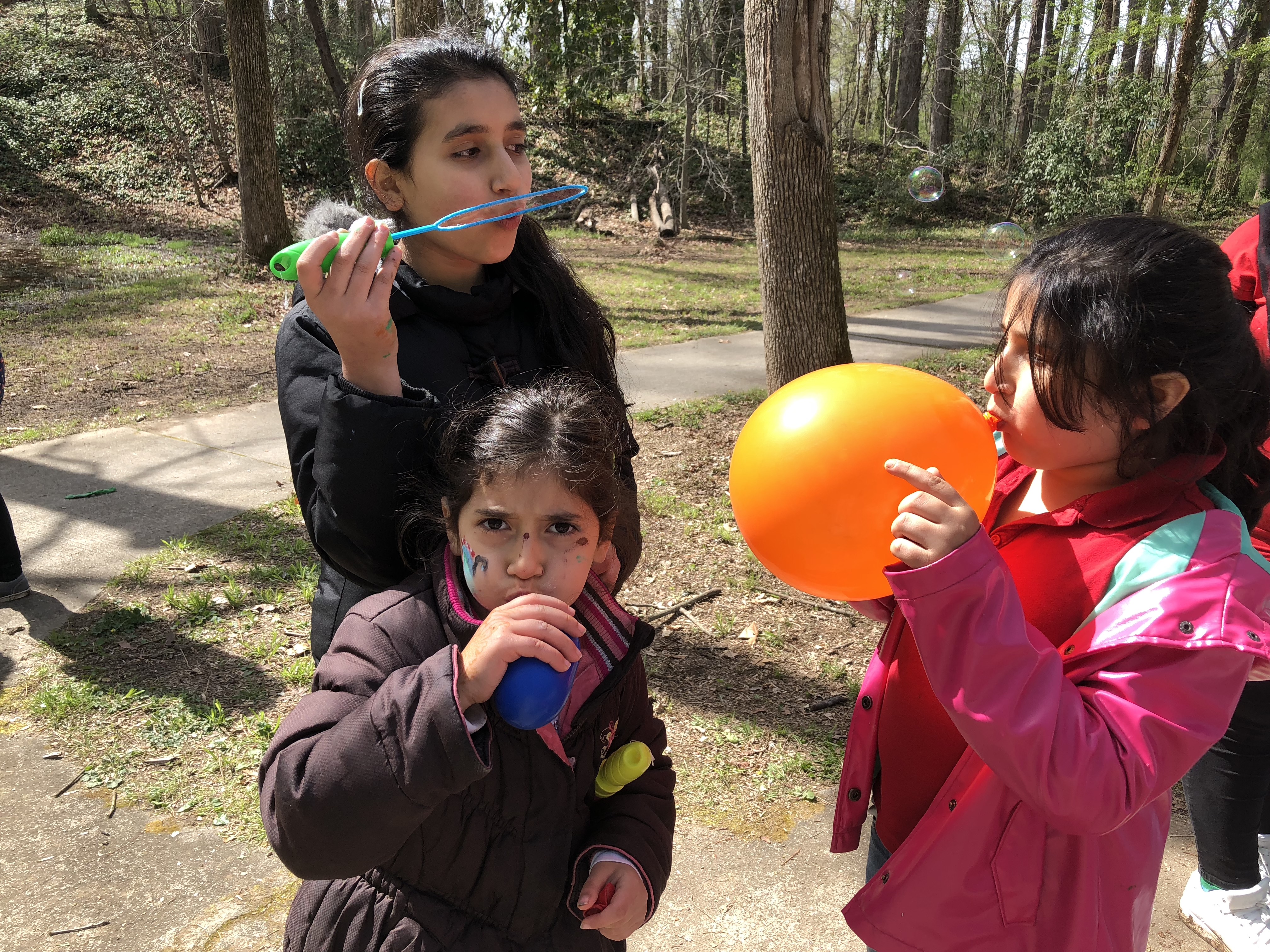
Sherwood Githens Middle School sixth grader Sedra Khatib blows bubbles at the annual Community Field Day at Rockwood Park in Durham. The event, hosted by UNC-Chapel Hill Muslim Students Association and the Zakat Foundation, brings together different refugee families for a day of entertainment outside. Staff photo by Ramishah Maruf.
Sixth-grader Sedra Khatib cried on her first day at Lakewood Elementary School in Durham last year.
“[The school] didn’t have a bus to go to home. And they asked me, and I didn’t understand,” Sedra said. “They called my dad and they call him and he said he will come. They had to use [Google Translate]. I was crying.”
At the time, Sedra barely knew English. Sedra, along with her parents and eight siblings, arrived in Durham as refugees 1 1/2 years ago. Before their resettlement, the family, originally from Syria, lived in Jordan for four years.
But on Saturday, Sedra was talking about the friends she made at Sherwood Githens Middle School in almost perfect English. She and other refugee families were at Rockwood Park near the Forest Hills neighborhood in Durham for the annual Community Field Day, hosted by the Zakat Foundation of America and the UNC-Chapel Hill Muslim Students Association.
“For the families, this an escape from the daily grind,” Rizk Alghorazi, UNC-CH junior and MSA community outreach chair, said. “The parents are always at work and the kids are at school. [The field day] is a different environment where the tutors can hang out in a setting where they don’t have to work.”
The Zakat Foundation is a Chicago-based Muslim non-profit with a chapter in Durham. They helped the UNC MSA get in contact with refugee families they volunteer with every week and provided financial support for the field day.
The field day featured a bounce house and stations for henna tattoos and face-painting. Mothers caught up with each other as children painted at the art studio and ate cotton candy.
“It’s a great bonding experience,” Alghorazi said.
A learning curve
2,475 refugees arrived in North Carolina in 2015, according to The News & Observer, and North Carolina had the ninth-highest amount of Syrian refugees in the United States in 2016, according to ABC11.
When the Khatib family arrived in 2016, they were resettled in Durham, and the nine children, whose ages range from 5 to 23, were enrolled in the Durham County Public Schools System.
From the beginning, Sedra and her 13-year-old sister Sana said Durham was different from their school in Jordan.
“The teachers come to class and they come to you,” Sana said. “If you have math, the teacher will come to you. If you have science, the teacher will come to you. At lunch, you can buy anything you want. Candy, sweets, juice.”
Sana said the word ‘juice’ in a heavy accent. Sedra whipped her head around and laughed.
“Shoes? You want to buy shoes at school?” Sedra said.
“Juice! I said juice!” Sana said.
They both dissolved into giggles.

Sedra Khatib (back), Alma Khatib (front left) and Tala Khatib (front right) blow bubbles and balloons at the annual Community Field Day at Rockwood Park in Durham. They are three of nine siblings, who are Syrian refugees resettled in Durham. Staff photo by Ramishah Maruf.
Alghorazi said the language barrier is just the first obstacle newly-resettled refugees have to face when arriving in America.
“Once you learn the language you have to learn the culture as well,” Alghorazi said.
When Sana first began school in Durham, she said many people made fun of her for not knowing English. However, she said she has more friends now, many of whom are also Arab and go to school with her.
“We miss Jordan sometimes,” Sedra said. “We had a lot of friends there. But middle school is better now because we made more.”
Life in America
The Khatib sisters enjoy their life in Durham. Although Sana said she misses the food in Jordan, she found a restaurant in Durham that she loves.
“Chick-Fil-A,” Sana said. “It’s so good.”
Sedra seems to be a budding photographer. She pointed to a wall with a Dr. Seuss quote, saying it would be a good backdrop to take photos in. She directed her sister to the spot where she should stand for a picture, and blew bubbles into the frame of the shot.
“I thought it would make the picture prettier,” Sedra said sheepishly.
Community Outreach
Most of the refugee families UNC-CH MSA helps live in Durham. Alghorazi said the program has grown since last year, and now students are going “every day of the week.” The Zakat Foundation recently opened a community outreach center in Durham for the families.
“Refugees don’t have family outside of their nuclear family,” Alghorazi said. “It’s hard for them to adjust. I guess that they need to know that there are people who actually care about them, and that there’s someone they can contact if they need help.”
Sana and Sedra said their brothers and sisters helped them adjust to the move to America. However, they were eager to form relationships with the volunteers, and the journalists, at the field day.
“We have fun at the park, and we meet new friends,” Sedra said. “I don’t see anybody my age, they’re either big or small. But we [met] new friends like you.”